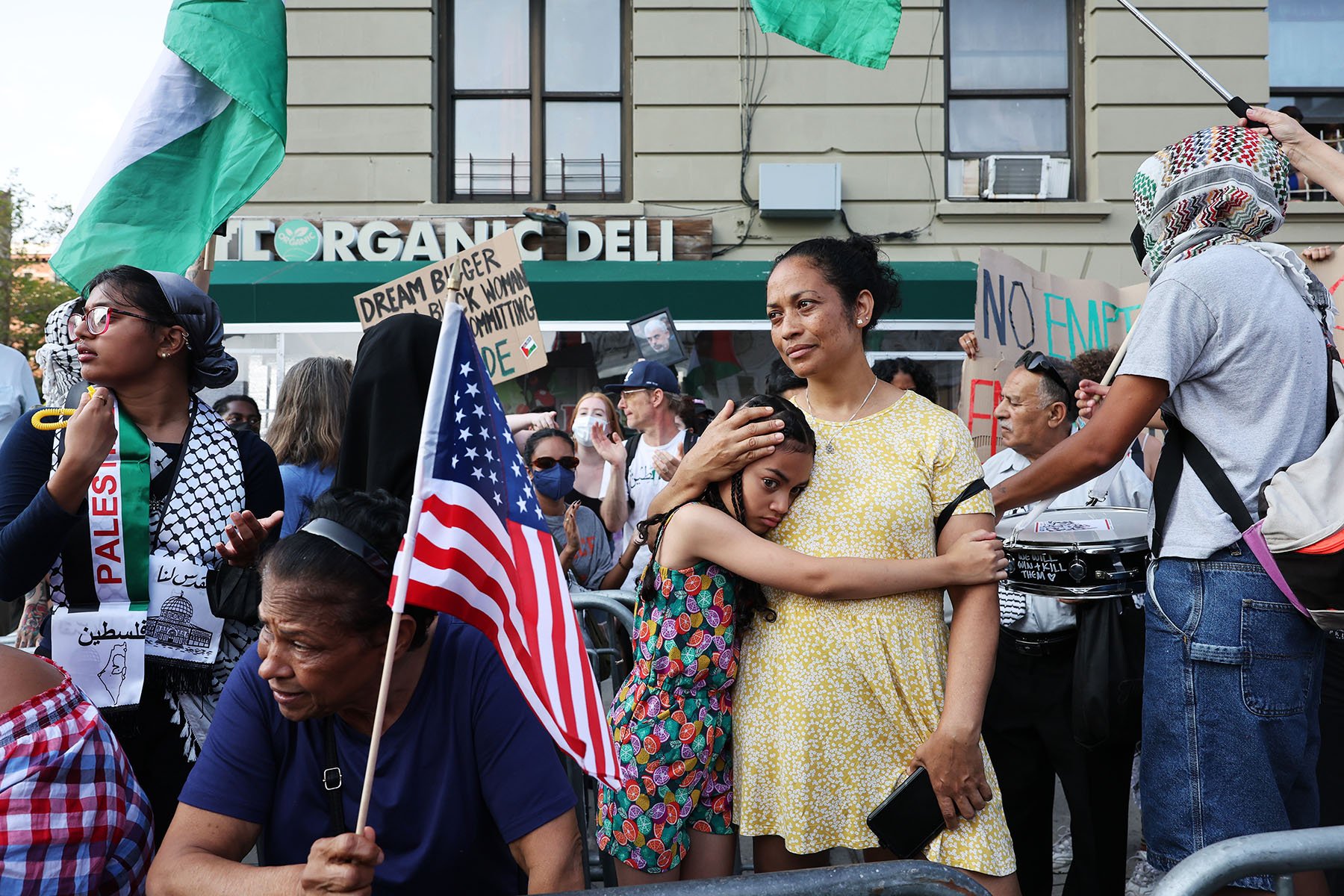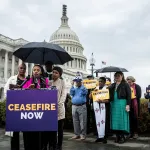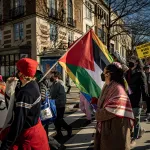Your trusted source for contextualizing Election 2024 news. Sign up for our daily newsletter.
Three days after Vice President Kamala Harris announced her presidential campaign, over 9,000 South Asian Women gathered on Zoom to share their enthusiasm. Speakers expressed joy and excitement about seeing one of their own, Harris, running for the highest office in the land with a record of championing abortion, gun control and family-friendly economic policies.
Hundreds of messages flooded the call’s chat function as attendees made plans to connect and organize across the country. But among the excitement and planning were also messages criticizing Harris’ position on Gaza as Israel’s military onslaught continues to kill Palestinians.
Poorna Jagannathan, who is most well-known in the United States for her role in Netflix’s “Never Have I Ever,” was the only one who directly spoke about the current Israel-Hamas war, which is now in its eleventh month. She said this is a “multi-issue election” for her, citing the future of reproductive rights, democracy and Gaza. Of Harris, Jagannathan said, “I want to know where she stands but I do know regardless of what she’s doing, she’s the only candidate that I feel can shape the politics, that my values and my voice will be valued.”
Many South Asian women like Jagannathan are reconciling the joy at seeing themselves represented in a presidential nominee and the frustration at how the Biden-Harris administration has handled the situation in Gaza. Harris’ ascent to the top of the presidential ticket has highlighted the South Asian American community like never before. Some South Asian women and LGBTQ+ people want to leverage their political power to pressure Harris to push for a permanent ceasefire and arms embargo to Israel.
Fifty-two percent of Indian-American voters said the conflict in Gaza was an issue that was extremely important or very important in deciding their vote this election year, according to polling conducted in April and May by AAPI Data and several partners.
At the South Asian Women for Harris call, speakers repeatedly emphasized Harris’ compassion and listening skills, often through personal anecdotes. They also stressed that she is not President Joe Biden, who has emphasized U.S. support for Israel.
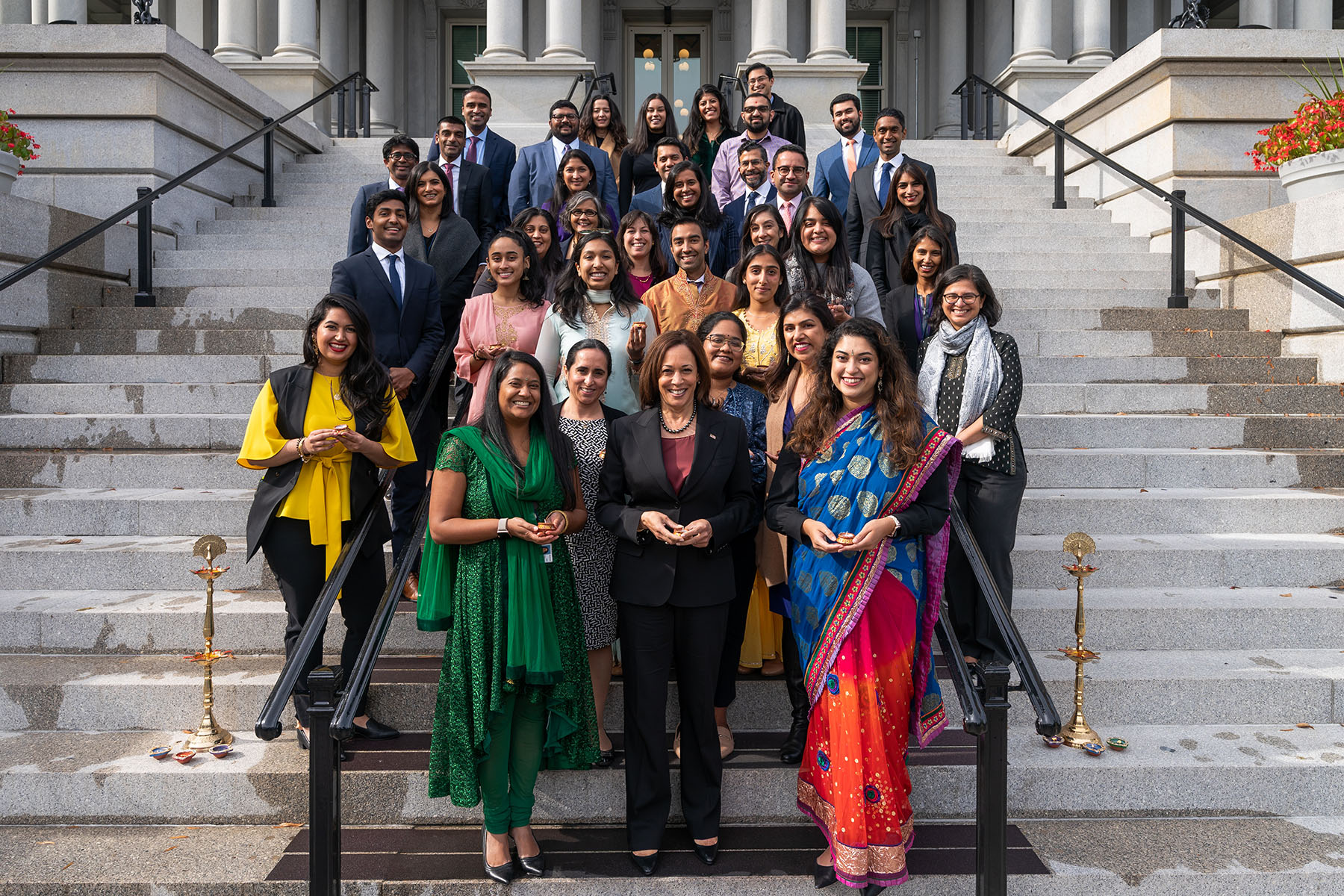
Swati Joshi is a member of the national board of directors of They See Blue, an organization that mobilizes South Asian Americans to get out the vote for Democrats. She runs a WhatsApp group of “aunties and betis,” South Asian women who are evangelizing for Harris, whose members are most concerned about reproductive rights and common-sense gun laws.
For Joshi, former President Donald Trump is the main threat — both to Americans and to Palestinians. She noted that one of Trump’s first acts upon becoming president was banning people from seven mostly Muslim countries from entering the United States. “I think if he got into power, Gaza is never going to get fixed,” she said. “He’s going to have the Muslim ban. We won’t have any kind of freedom. Democracy will get wiped out.”
Since launching her presidential campaign, Harris has drawn huge crowds and garnered enthusiasm. Meanwhile, the Biden-Harris administration’s support of Israel has largely alienated Arab and Muslim communities, which include some South Asians.
“Identity by itself is not enough for a lot of South Asians who are eager to have more analysis and conversations on policy issues, and in particular on Gaza,” said Deepa Iyer, a lawyer and author of “We Too Sing America,” a book that documents South Asian, Muslim, Arab and Sikh community histories in the wake of 9/11, when discrimination increased in the United States.
Many countries in South Asia have large Muslim populations; in several, Islam is the state religion. Organizers have noted that particularly among young South Asians, the Israel-Hamas war and ongoing military assault in Gaza ranks as one of the most important political issues this election year.
Hajar Yazdiha, a sociologist and professor at the University of Southern California, said the linkage between South Asian communities and the pro-Palestinian movement “is a natural extension of a long-standing solidarity politics against Islamophobia and American imperialism.” The conflict in Gaza, she said, reopens wounds for South Asian and Muslim communities who faced heightened scrutiny and discrimination in the years following 9/11.
“These communities followed all the rules of being a model immigrant in the United States, they jumped through all the impossible hoops, they condemned religious extremists, they waved their American flags, and still, they are treated as disposable at best and as threats to the nation at worst,” Yazdiha said.
For many, she said, “Gaza was an inflection point where the Biden administration lost all credibility, it broke the trust.”
Yasmine Ramachandra attended the South Asian Women for Harris call to encourage others who were there to donate to families in Gaza. Ramachandra has seen South Asian women who considered themselves apolitical suddenly go all-in on Harris because of her identity, but they are waiting for Harris to commit to stronger action in favor of Palestinians before deciding whether to vote for her.
“It’s difficult to think to tear down what other people feel like is hope for them because they see themselves in her when I’m feeling very hopeless about the platform that she’s on right now,” they said.
To vote for Harris, Ramachandra said, they “would need to see promises and action at the same time, because she has the privilege to do something right now.”
Pro-Palestinian activists are pushing for the United States to put an arms embargo on Israel, which would be a major departure in longstanding U.S. policy. Harris’s advisers have so far rejected this idea, but some say they won’t vote for her without it.
Nova, who is Bangladeshi American and uses a mononym for safety reasons, said they won’t decide until November whether they’ll vote for Harris. They’re frustrated that Harris’ policy platform isn’t available yet and have been advocating for an arms embargo.
For Nova, the crisis in Gaza feels personal. Bangladesh, formerly East Pakistan, won independence in 1971 after a ruthless military offensive by present-day Pakistan that amounted to genocide. The United States refused to intervene against their ally Pakistan, allowing massacres to continue using American weapons. Nova sees a parallel between that history and contemporary Israel and Palestine.
“I am not letting go of hope at this very moment. I want to work with people,” they said. “I think I owe it to the Palestinian people. I think I owe it to the Bangladeshi people to put this pressure on her.”
Harris has rarely talked about the Israel-Hamas war that began October 7, after the militant ruling party of Gaza attacked Israel, killing 1,200 people, according to the Israeli military. When she does speak, she affirms Israel’s right to defend itself, particularly against Iran. She has, however, differentiated herself from Biden by underscoring the humanitarian crisis intensified by the war, which has displaced millions in Gaza; killed tens of thousands of Palestinians, according to Gaza’s Health Ministry; and left thousands more are at risk of starvation, per a review by United Nations experts.
Activists, voters and pundits are gauging Harris’ emotions when she does speak, trying to suss out more specific positions. One looming question is whether she will suspend military aid to Israel, one of their key demands.
They’ve been heartened by Harris’ running mate selection of Gov. Tim Walz of Minnesota, who leads a state with a significant population of immigrants and refugees and one of the country’s largest Muslim communities. Many see Walz as “a promising signal of change and the power of protest,” Yazdiha said, “a rare candidate who has expressed empathy for Palestinians, and by extension, other historically dehumanized groups.”
The delicate and often tense relationship between Harris and pro-Palestanian activists was on full display at her August 7 rally in Detroit, which is home to a large, well-established and politically successful Arab-American community.
Before the rally, Harris met with Layla Elabed and Abbas Alaweih, the leaders of a movement to vote “uncommitted” in the Democratic presidential primary. They said Harris displayed genuine concern and empathy for civilians killed in Gaza and seemed open to meeting further with the group to discuss an arms embargo.
During the rally, Harris was twice interrupted by protesters. The first time, she said, “It’s all good. I’m here because we believe in democracy. Everyone’s voice matters. But I am speaking now.” But when she was interrupted again moments later, she pointedly hit back: “You know what? If you want Donald Trump to win, then say that. Otherwise, I’m speaking.”
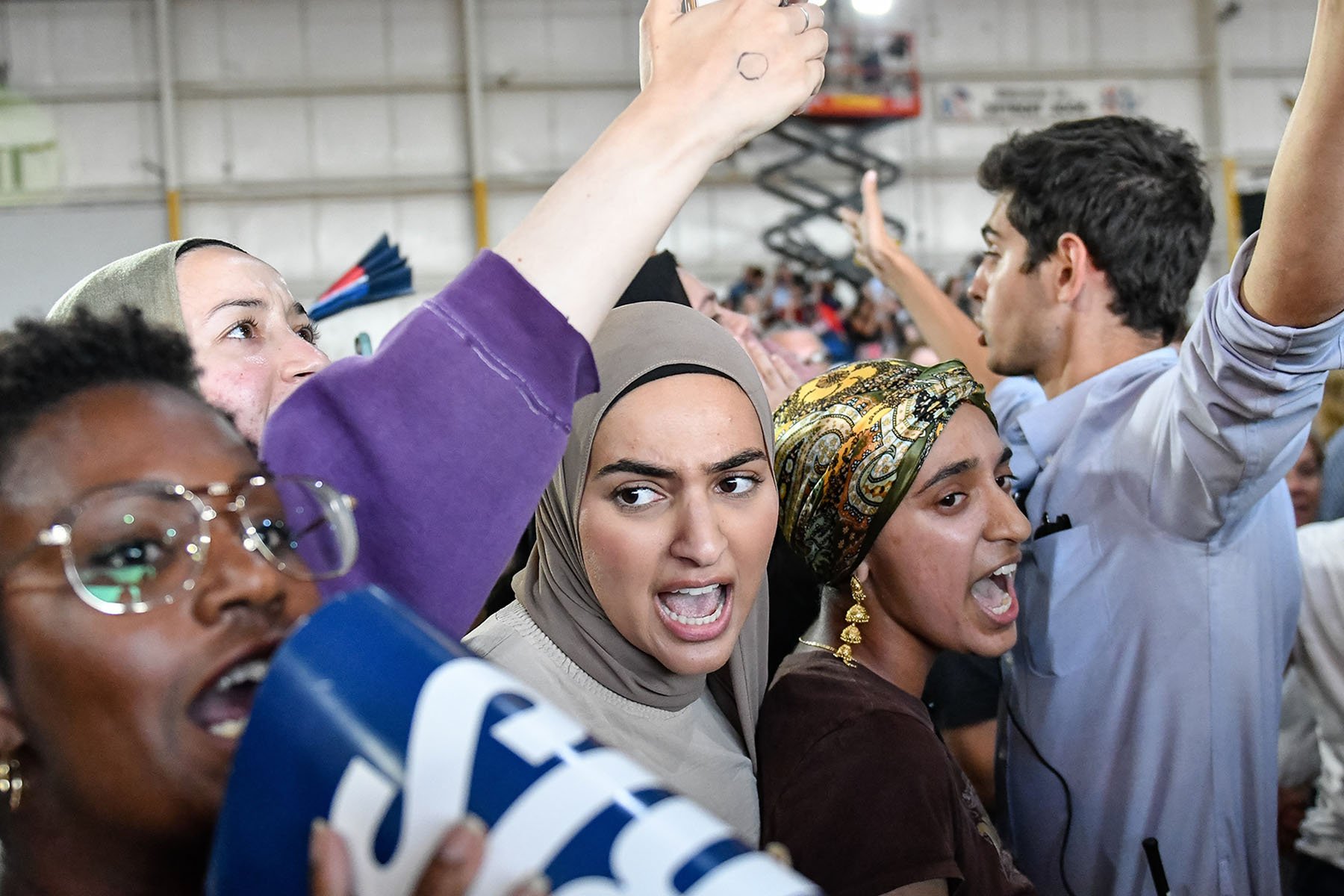
(Adam J. Dewey/Anadolu/Getty Images)
Two days later, protesters came after her once again at a rally in Arizona. This time, Harris struck a different tone, saying, “The president and I are working around the clock every day to get that ceasefire deal done and bring the hostages home. So, I respect your voices, but we are here to now talk about this race in 2024.”
“As [Harris] has said, it is time for this war to end in a way where: Israel is secure, hostages are released, the suffering of Palestinian civilians ends, and the Palestinian people can realize their right to dignity, freedom, and self-determination,” a spokesperson for the campaign told Politico.
Andrew Peng, the AANHPI spokesperson for the Harris campaign, said in a statement to The 19th that the campaign is “making significant investments in staffing and paid media, crafting in-language materials to combat disinformation in South Asian communities, and organizing culturally specific direct voter contact activities and events.”
The Harris campaign has also brought on a senior adviser, Nasrina Bargzie, to lead outreach to Muslim and Arab-American communities, NBC News first reported.
“We’re encouraging people to consider the totality of the candidate and the type of country they want to live in and where the government might be more receptive to disagreements and being pushed on policy versus not,” said Sarah Shah, senior director of strategic communications and partnerships at Indian American Impact, which works to elevate Indian Americans and South Asians in politics and is supporting Harris.
A coalition of South Asian women leaders organized to discuss election strategy on August 1. Gaza was the policy issue attendees were most concerned about.
Participants were curious about Harris’ platform in general, but there is a sense of urgency around Gaza, said Iyer, who co-hosted the event.
People want action, not just verbal commitments, said Shivana Jorawar, a gender justice leader who works with the Indo-Caribbean community in New York City and helped organize the event. “She does have the power right now, and every minute that passes by, another person is dying.”
From there, a petition was circulated, recognizing the “historic nature” of Harris’ candidacy while asking her to commit to calling for an “immediate and permanent ceasefire in Gaza” — something the Biden-Harris administration has already verbally committed to. The petition also calls for an arms embargo against Israel and the “constitutional right to support Palestine through speech, dissent and advocacy.” The group aims to get 1,600 signatures; as of Thursday morning, it has more than 1,100.
When it comes to support for Harris and push for accountability in Gaza, “I don’t think it’s an either-or,” said Iyer. “I think it’s a both-and. That’s what shows we as a community have a nuanced political analysis, and we understand elected leaders are there to represent us and our issues.”
To check your voter registration status or to get more information about registering to vote, text 19thnews to 26797.
